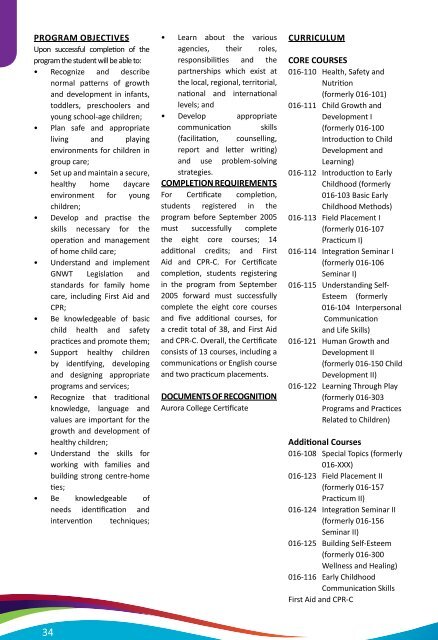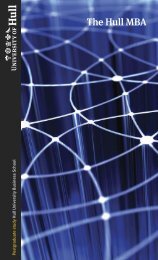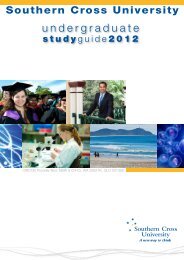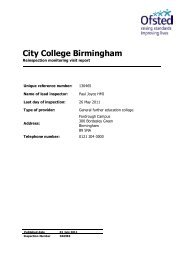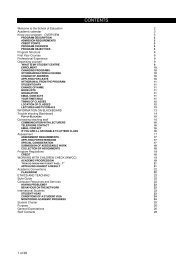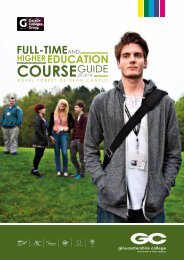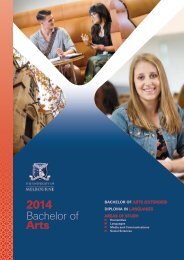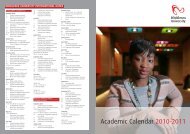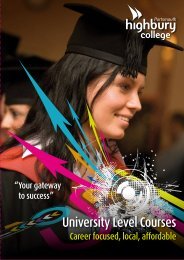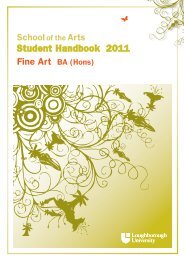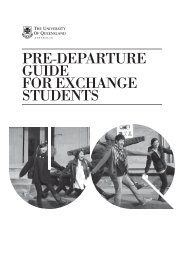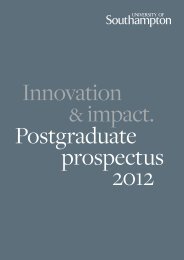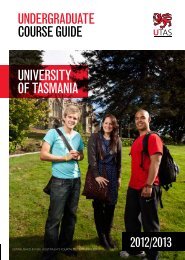2012-2013 AcAdemic cAlendAr
2012-2013 AcAdemic cAlendAr
2012-2013 AcAdemic cAlendAr
Create successful ePaper yourself
Turn your PDF publications into a flip-book with our unique Google optimized e-Paper software.
Program Objectives<br />
Upon successful completion of the<br />
program the student will be able to:<br />
• Recognize and describe<br />
normal patterns of growth<br />
and development in infants,<br />
toddlers, preschoolers and<br />
young school-age children;<br />
• Plan safe and appropriate<br />
living and playing<br />
environments for children in<br />
group care;<br />
• Set up and maintain a secure,<br />
healthy home daycare<br />
environment for young<br />
children;<br />
• Develop and practise the<br />
skills necessary for the<br />
operation and management<br />
of home child care;<br />
• Understand and implement<br />
GNWT Legislation and<br />
standards for family home<br />
care, including First Aid and<br />
CPR;<br />
• Be knowledgeable of basic<br />
child health and safety<br />
practices and promote them;<br />
• Support healthy children<br />
by identifying, developing<br />
and designing appropriate<br />
programs and services;<br />
• Recognize that traditional<br />
knowledge, language and<br />
values are important for the<br />
growth and development of<br />
healthy children;<br />
• Understand the skills for<br />
working with families and<br />
building strong centre-home<br />
ties;<br />
• Be knowledgeable of<br />
needs identification and<br />
intervention techniques;<br />
• Learn about the various<br />
agencies, their roles,<br />
responsibilities and the<br />
partnerships which exist at<br />
the local, regional, territorial,<br />
national and international<br />
levels; and<br />
• Develop appropriate<br />
communication skills<br />
(facilitation, counselling,<br />
report and letter writing)<br />
and use problem-solving<br />
strategies.<br />
Completion Requirements<br />
For Certificate completion,<br />
students registered in the<br />
program before September 2005<br />
must successfully complete<br />
the eight core courses; 14<br />
additional credits; and First<br />
Aid and CPR-C. For Certificate<br />
completion, students registering<br />
in the program from September<br />
2005 forward must successfully<br />
complete the eight core courses<br />
and five additional courses, for<br />
a credit total of 38, and First Aid<br />
and CPR-C. Overall, the Certificate<br />
consists of 13 courses, including a<br />
communications or English course<br />
and two practicum placements.<br />
Documents of Recognition<br />
Aurora College Certificate<br />
CURRICULUM<br />
CORE courses<br />
016-110 Health, Safety and<br />
Nutrition<br />
(formerly 016-101)<br />
016-111 Child Growth and<br />
Development I<br />
(formerly 016-100<br />
Introduction to Child<br />
Development and<br />
Learning)<br />
016-112 Introduction to Early<br />
Childhood (formerly<br />
016-103 Basic Early<br />
Childhood Methods)<br />
016-113 Field Placement I<br />
(formerly 016-107<br />
Practicum I)<br />
016-114 Integration Seminar I<br />
(formerly 016-106<br />
Seminar I)<br />
016-115 Understanding Self-<br />
Esteem (formerly<br />
016-104 Interpersonal<br />
Communication<br />
and Life Skills)<br />
016-121 Human Growth and<br />
Development II<br />
(formerly 016-150 Child<br />
Development II)<br />
016-122 Learning Through Play<br />
(formerly 016-303<br />
Programs and Practices<br />
Related to Children)<br />
Additional Courses<br />
016-108 Special Topics (formerly<br />
016-XXX)<br />
016-123 Field Placement II<br />
(formerly 016-157<br />
Practicum II)<br />
016-124 Integration Seminar II<br />
(formerly 016-156<br />
Seminar II)<br />
016-125 Building Self-Esteem<br />
(formerly 016-300<br />
Wellness and Healing)<br />
016-116 Early Childhood<br />
Communication Skills<br />
First Aid and CPR-C<br />
Course Descriptions<br />
016-110<br />
Health, Safety and Nutrition<br />
Formerly 016-101<br />
30-hour course / 2 credits<br />
This 30 hour course will focus<br />
on exploring the unique health,<br />
safety and nutritional needs of<br />
children. Emphasis will be placed<br />
on the integral role caregivers<br />
play, in collaboration with parents,<br />
in maintaining and improving<br />
children’s overall health status.<br />
The health and safety component<br />
highlights developing an<br />
understanding of current concepts<br />
of health and wellness, promoting<br />
health in children and their<br />
caregivers, creating and managing<br />
safe and healthy environments,<br />
and managing illness in children.<br />
The nutrition component stresses<br />
the development of good<br />
nutritional practices by identifying<br />
the characteristics of a nutritious<br />
diet, reviewing safe food handling<br />
practices and preparation,<br />
and planning nutritious meals<br />
and snacks for children. Also<br />
included will be an exploration<br />
of the importance of including<br />
developmentally appropriate<br />
health, safety and nutrition<br />
experiences in your childcare<br />
program.<br />
016-111<br />
Child Growth and Development I<br />
Formerly 016-100 Introduction to<br />
Child Development and Learning<br />
60-hour course / 4 credits<br />
In conjunction with 016-121<br />
Human Growth and Development<br />
II, this course provides the student<br />
with a basic understanding of<br />
child development relevant to<br />
him/her facilitating the growth<br />
and development of young<br />
children. Emphasis is placed on<br />
the uniqueness of individuals.<br />
016-112<br />
Introduction to Early Childhood<br />
Formerly 016-103 Basic Early<br />
Childhood Methods<br />
60-hour course / 4 credits<br />
This 60 hour course provides a<br />
beginning for students who seek<br />
to understand the goals and<br />
philosophy for an individualized,<br />
play-oriented, child-centred<br />
program for young children.<br />
Students will examine the role of<br />
an adult in facilitating a quality,<br />
early childhood program.<br />
The art experiences will provide<br />
students with the opportunity<br />
to explore and experiment with<br />
a wide variety of materials being<br />
used in early childhood programs.<br />
By using these materials, students<br />
will gain skills that will enable<br />
them to design and implement<br />
creative experiences for young<br />
children.<br />
The art experiences workshop will<br />
be presented to your instructor<br />
by video-tape. It is expected that<br />
each community will choose a<br />
topic and work as a group to<br />
meet the assignment outcomes.<br />
Communities with 6 or more<br />
participants will be expected<br />
to divide into groups with 3 – 5<br />
students per group. Instructions<br />
and procedures for implementing<br />
these experiences will be<br />
discussed and clarified in class.<br />
016-113<br />
Field Placement I<br />
Formerly 016-107 Practicum I<br />
240-hour placement / 4 credits<br />
Prerequisites/Co-requisites: 016-<br />
111, 016-112, and 016-114<br />
This course will provide students<br />
with an introduction to the<br />
practical field of Early Childhood<br />
Development and the opportunity<br />
to observe children in a variety of<br />
settings. For each of the classes,<br />
students will observe children in a<br />
variety of settings.<br />
The students will complete the<br />
practicum by working with children<br />
in one setting. In conjunction with<br />
the Integration Seminar, students<br />
will have the opportunity to discuss<br />
and integrate these observations<br />
in relation to theoretical concepts<br />
obtained from the pre-requisite<br />
courses, 016-112 Introduction<br />
to Early Childhood and 016-111<br />
Child Growth and Development<br />
I. This course will also help begin<br />
to prepare the student for the<br />
profession.<br />
016-114<br />
Integration Seminar I<br />
Formerly 016-106 Seminar I<br />
15-hour course / 1 credit<br />
Prerequisite(s): 016-111 and 016-<br />
112 ; Co-requisite: 016-113<br />
The 15 hour Integration Seminar<br />
provides a bi-weekly session<br />
with the student’s College Field<br />
Coordinator and other students to<br />
discuss field placement experiences<br />
and further integrate class work<br />
with the field experience. The<br />
seminar will provide opportunities<br />
to discuss issues and explore topics<br />
in Early Childhood Development<br />
that are not specifically dealt with<br />
in the classroom. The seminar<br />
will also focus on developmentally<br />
appropriate practices in Early<br />
Childhood Programs.<br />
34 35


